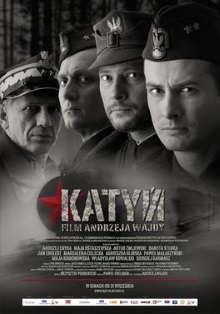
This film was added to our list last year when its director Andrzej Wajda passed away and eulogies of him appeared in a bunch of places. He is considered one of Poland’s premier directors and this is apparently one of the more notable of his works though he has directed many films across a long and fruitful career.
In 1939, Poland is caught between the Soviet Union invading from the east and the Germans invading from the west. Andrzej is a captain with a unit that has been captured by the Soviet army. The enlisted men are allowed to leave while the officers are imprisoned. Meanwhile the Germans occupy the city of Cracow and cracks down on the university there, imprisoning the professors including Andrzej’s father. His wife desperately waits for his return and for years there is no news. By 1943, the Germans attack the Soviets and announce that many of those imprisoned have been killed by the Soviets in the Katyn forest. Yet this truth lasts only a short time as after the end of the war, a new regime controlled by the Soviet Union rules Poland and blames the massacre on the Germans instead. These events are recounted from the perspectives of multiple Poles including Andrzej and various members of his family, other officers who have been imprisoned and even ordinary Polish students during the Soviet occupation.
This isn’t an easy film to comprehend as it seems to have been made with a Polish audience in mind who would already be familiar with the Katyn massacre. It might be best to approach this equipped with at least some knowledge of Poland’s history throughout the Second World War. It also switches its focus onto different characters at various points and it took me a while to work out their relationships given the language barrier and the near impossibility of recognizing their names. Still, persevere and you’ll find watching this to be a rewarding and powerful experience. The horror takes a while to build up but it pulls no punches. Unusually, the audience first hears of the massacre in the same way that the families of the victims do but the film doesn’t actually show us the scene itself until the end. When it does so, the impact is simply indescribable.
One thing that especially fascinates me is that it is absolutely unflinching. The standard formula of a Hollywood-produced historical drama of this sort is to latch on to the story of a lone survivor or find some other way to soften the edges or offer a ray of hope. It’s a bit of a spoiler but I’ll say here that not a single one of the male characters in this film ultimately ends well. It sometimes seems like Katyń even goes out of its way to twist the knife in. One of the post-war scenes show the universities opening up again and students signing up for classes. One of the professors even makes a comment about what a hopeful sign that is. Yet mere moments later it is cruelly dashed to pieces in the face of the Soviet government’s insistence that the massacre was perpetrated by the Germans and that all attempts to say otherwise is a form of treason. It feels very much like evidence of an astonishingly different mindset from that of the west.
I think it’s best to pair this with a separate reading of an account of the massacre and some knowledge of Poland’s history under Soviet occupation wouldn’t go amiss either as this film provides little in the way of background or historical facts. What this film does do is deliver the emotional punch behind those facts and makes them feel real to the audience. This alone is sufficient to make this a great film but if it helps to bring the world’s attention to one of the lesser known atrocities, then so much the better.